News
Christina Aguilera launches sexual wellness brand to ‘shift the narrative’ around female sexuality
The singer wants to champion the brand’s mission to create an open dialogue around sexual wellness

Christina Aguilera has been named the co-founder and chief brand advisor of the sexual wellness brand Playground.
The Grammy Award-winning singer will be working alongside Playground co-founder and CEO, Catherine Magee, and co-founder and chief product officer, Sandy Vukovic, to reduce stigma and improve sexual wellness for women through “ground-breaking” intimacy products.
Six out of ten women struggle with arousal issues and sexual discomfort, according to Playground.
However, as women invest more intentionally in their sexual experiences, they will see improvement in mood, health and their intimate relationships.
Aguilera has always used her voice to reduce the stigma around female sexuality, and in her role with the San Francisco-based start-up, she wants to further champion the brand’s mission to create an open dialogue around sexual wellness while keeping the female perspective at the forefront of the business.
“I continue to encourage women to feel empowered while owning every aspect of themselves, and to treat sexual wellness as part of a regular self-care routine,” the 42-year-old singer and co-founder said in a statement.

“The category has largely been driven by a male dominated business model, with few products designed from inception for female specific sexual pleasure and health needs.
“I’m thrilled to be part of a woman-owned business, and building a brand where women can recognise Playground as a product that is speaking to them with an informed perspective.”
Playground co-founder and CEO, Catherine Magee, said: “What’s been missing in the overall health and wellness conversation is the role of sexual health. Christina is the perfect voice to champion female sexuality.
“She has always proudly embraced her sexuality and has been unafraid to share it with her fans through her music or her own voice.
“As Playground’s chief brand advisor and co-founder, Christina has the platform to empower women to fully prioritise their sexual wellness.”
The brand wants to pioneer the growing sexual wellness category by launching the first and only FDA-approved personal lubricant to address women’s larger sexual pleasure needs.
With its debut collection, the company says it aims to “democratise” access to sexual wellness products and champion every woman to think of sexual wellness as an essential part of their everyday life.
News
AI for women’s health: A new era of enablement

By Ema: AI for women’s health and wellness
We launched the AI for Women’s Health Pilot to give women innovators the freedom to build what the next decade of healthcare will look like.
By reducing cost barriers, we invited companies to experiment boldly – to test, deploy, and imagine how intelligent systems could repair the gaps traditionally seen in women’s health.
The goal was to prove what’s possible when AI becomes a connector that helps teams build tools that make care more accessible, more human, and more aligned with how women actually live and heal.
What the Pilot Applications Told Us about What Companies Want to Build
In four weeks, hundreds of companies applied to the pilots.
Many were early-stage, but already in motion, referencing beta launches, active users, and technical roadmaps built around real care gaps.
Across the board, innovators were trying to fix moments in care that are historically underserved, emotionally complex, and structurally misaligned: postpartum rage, painful sex, caregiver burnout, benefits confusion, and perimenopausal fatigue.
-
- 90 per cent of applicants were pre-seed to Series A, with the largest segment being Seed stage. Of those, over two-thirds had a working product and were seeking an AI layer that could evolve with them. Applicant companies were based in North America, Europe, and Asia.
- The top two categories were mental health and reproductive care innovation, with menopause and sexual health being the runner ups (more than 10 per cent of applicants). Postpartum trauma, anxiety, fertility tracking, and caregiver overload were common threads throughout applications, too.
- 55 per cent were actively building with AI already, and another 32 per cent were exploring its use for the first time. Most weren’t trying to invent new models. They were looking to integrate something smart, safe, and specific: AI not as the product, but as the thing that makes their products (i.e: mobile app) work better.
- The most requested use case was care navigation. Nearly every use case came back to the same task: help users (patients, customers or clinicians) get to the next step faster, with less overwhelm. Smart routing, emotionally intelligent intake, and context-aware flows dominated the design conversations.
- The language said even more than the numbers. Across applications, we saw the same phrases show up again and again:
“Care gaps.”
“Overwhelmed.”
“Too many tools, not enough guidance.”
“I built this after my own experience with ____.”
Five Key Takeaways We Learned from Our AI for Women’s Health Pilot
One fact was obvious: AI is not a feature, it’s the invisible layer that makes products usable.
Across every pilot, AI served as the connective tissue between complexity and clarity, transforming static systems into adaptive, learning ones.
- AI succeeds where “old school” machine learning used to fail. It thrives in moments that can’t be hard-coded interpreting context, emotion, and ambiguity in real time.
- The biggest breakthroughs happen in broken care systems. Each pilot solved a gap in care (from postpartum grief to menopause confusion) showing that AI’s greatest value lies in repairing what traditional systems overlook.
- Navigation beats prediction. The most successful use cases weren’t about diagnosing problems, but guiding people to the next right step like triage, education, or referral. Helping women understand what they “might” need can change their lives.
- Emotion is data. AI that detects hesitation, urgency, or grief can meet people where they are with empathy. This creates trust and connection that static technology can’t deliver.
Meet the Pilot Winners!
The five companies selected for Ema’s inaugural pilot represent the next wave of leadership in women’s health.
Each one is solving for a care moment that most platforms still overlook and doing it faster, smarter, and more emotionally attuned than many of the biggest players in the market.
These companies didn’t just apply to casually explore AI, they understand where the system is broken, and have an innovation to fix it.
A trauma-informed mental health platform for new moms, partners, and families. Mamaya is using AI to power emotionally intelligent triage, helping users identify what they’re feeling and route to the right level of support quickly.
“So often, people know something feels off but don’t have the words or tools to explain it,” said Amy Green, founder of Mamaya. “That’s where Ema comes in, giving language and direction to the emotional fog of pregnancy, postpartum, or just trying to find care.”
A digital companion for pregnancy and postpartum. Flourish is building escalation pathways that adapt in real time, using AI to interpret symptom severity and emotional tone, then structure the next step.
“This technology will help us guide users to the support they need without overwhelming them with information, forms, or options they’re not ready for,” said Melissa Bowley, founder of Flourish.
A platform reinventing how employees access workplace wellness, benefits, and care policies. Work& is using AI to make topics like lactation, fertility, or medical leave easier to navigate, delivering the right answer, in the right tone, at the right time.
A first-of-its-kind navigation tool for people experiencing sexual pain and pelvic floor dysfunction. Pelvic People is using AI to help users describe their symptoms, understand what’s happening, and access trauma-informed care, all in language that feels safe, private, and clear.
A postpartum recovery brand combining physical care kits with emotionally intelligent support. Coddle is integrating AI to guide new moms through healing with tailored, real-time education that meets them where they are physically and emotionally.
Ema is the first AI built specifically to make women healthier and happier.
Designed by women, for women, Ema delivers trusted, evidence-based support across everything from menstrual health to mental well-being.
To learn more about Ema, email us at letsconnect@emaapp.co.
Stay tuned for individual announcements on all Pilot companies as their AI rolls out into the world!
Insight
Teeth of babies of stressed mothers come out earlier, study suggests

Maternal stress hormones in pregnancy are linked to earlier tooth eruption, with infants showing about four more teeth on average by six months, new research has revealed.
Researchers studied 142 mothers from socioeconomically disadvantaged backgrounds who were pregnant between 2017 and 2022.
They measured hormone levels in saliva during late pregnancy, including cortisol, sex hormones and thyroid hormones.
University of Rochester researchers then tracked when babies’ milk teeth emerged through regular dental checks at one, two, four, six, 12, 18 and 24 months after birth.
Women with the highest cortisol levels had babies with an average of four more teeth at six months compared with those with the lowest levels.
By six months, 15 per cent of infants had between one and six erupted teeth, while 97.5 per cent had between one and 12 teeth by their first birthday.
The study included mothers from varied backgrounds, with 52 per cent of children identified as African-American, 60 per cent of mothers having a high school education or lower, and 53 per cent employed.
While 36.6 per cent of women had depression or anxiety diagnoses during pregnancy, this was not directly linked to hormone levels or tooth eruption timing.
Dr Ying Meng, associate professor at the School of Nursing, said: “High maternal cortisol during late pregnancy may alter foetal growth and mineral metabolism, including the regulation of levels of calcium and vitamin D, both essential for mineralisation of bone and teeth.
“Cortisol is also known to influence the activity of so-called osteoblast and osteoclast cells, responsible for building up, shaping and remodelling bone.”
The findings suggest prenatal stress accelerates biological ageing in children.
Premature tooth eruption could serve as an early warning sign of compromised oral development and overall health linked to socioeconomic deprivation and prenatal stress.
Researchers also found weaker associations between maternal sex hormones, including oestradiol and testosterone, and greater tooth numbers at 12 months.
Similar links appeared between progesterone and testosterone levels and tooth count at 24 months, and between the thyroid hormone triiodothyronine and teeth at 18 and 24 months.
Meng said: “These results are further evidence that prenatal stress can speed up biological ageing in children.
“Premature eruption of teeth could thus serve as an early warning sign of an infant’s compromised oral development and overall health, associated with socioeconomic deprivation and prenatal stress.
“We still have key questions that need answering, for example which maternal hormones or downstream developmental pathways drive the change in the timing of tooth eruption, what the exact relationship is between accelerated eruption of teeth and biological ageing and development, and what such speeding up says about a child’s general health.”
News
Ocado launches ‘UK’s largest menopause aisle’
-
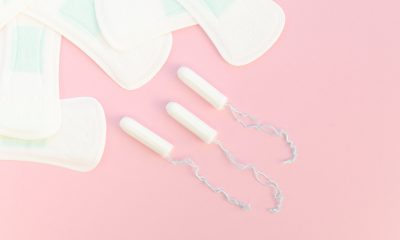
 News4 weeks ago
News4 weeks agoDozens of women report suffering painful burns after using Always sanitary towels
-

 News4 weeks ago
News4 weeks agoCutting through the noise in femtech – key takeaways from Women’s Health Week 2025
-
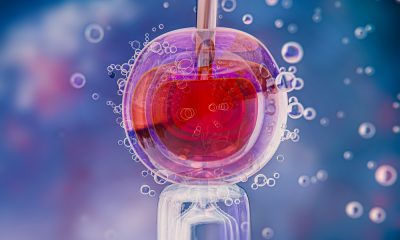
 News3 weeks ago
News3 weeks agoAI embryo selection tool wins European approval
-

 Hormonal health1 week ago
Hormonal health1 week agoOpinion: Not ‘just stress’ – How hormonal changes affect women’s brain function
-
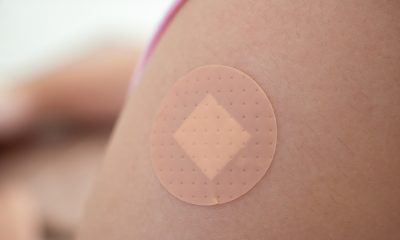
 Hormonal health3 weeks ago
Hormonal health3 weeks agoTestosterone patch shows promise for menopausal women
-
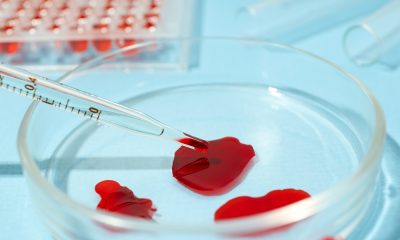
 Diagnosis4 weeks ago
Diagnosis4 weeks agoScientists develop breakthrough approach to detecting endometriosis in menstrual blood
-

 Features3 weeks ago
Features3 weeks agoFrom SEO to GEO: How women’s health brands can get found in the age of AI
-

 Hormonal health3 weeks ago
Hormonal health3 weeks agoFDA approves new menopause drug to treat hot flashes and night sweats











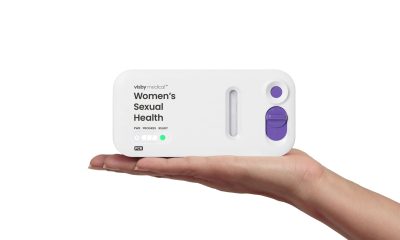














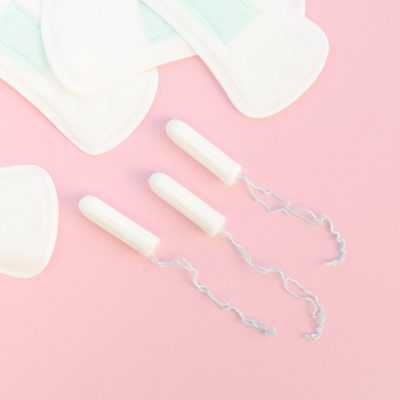

6 Comments